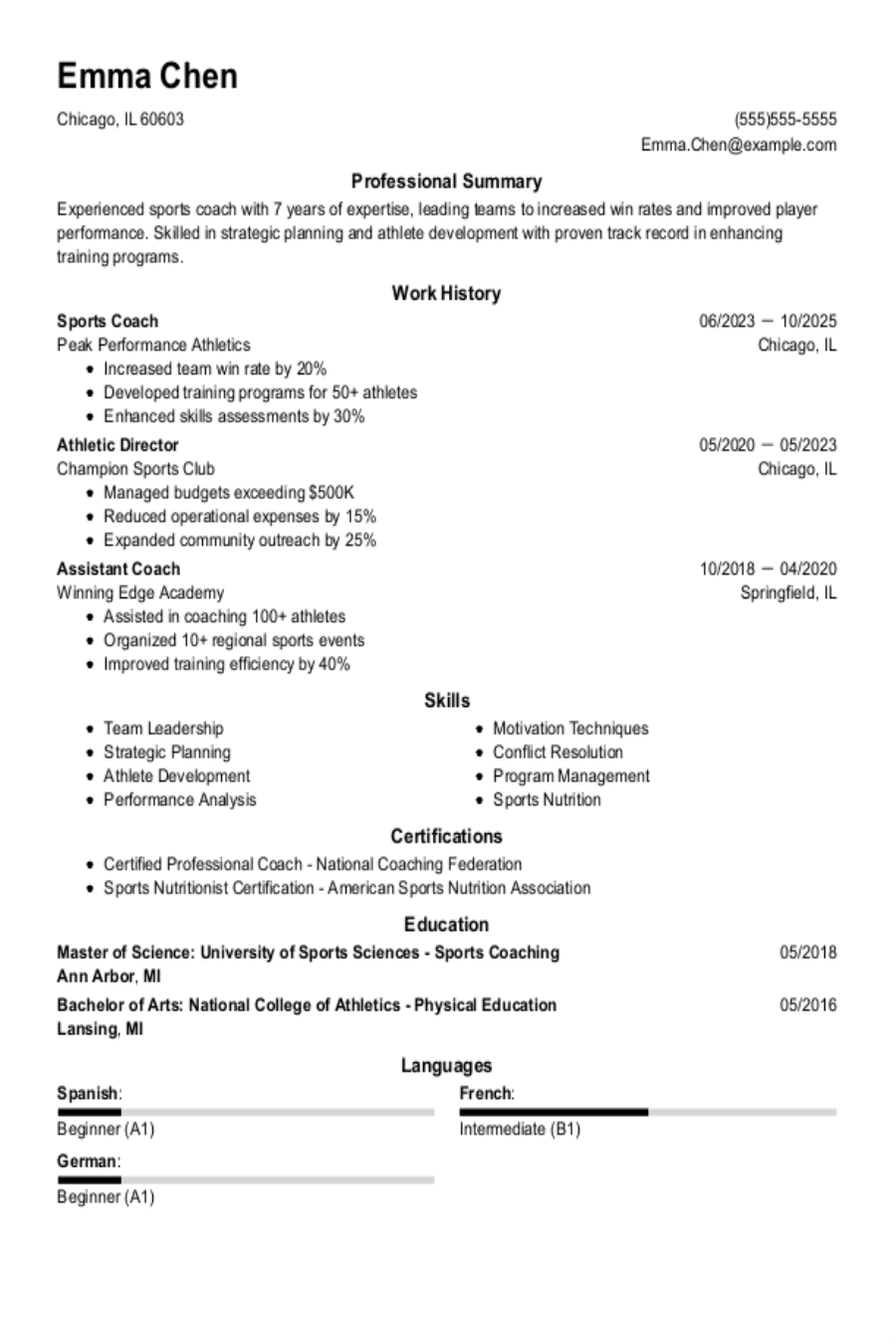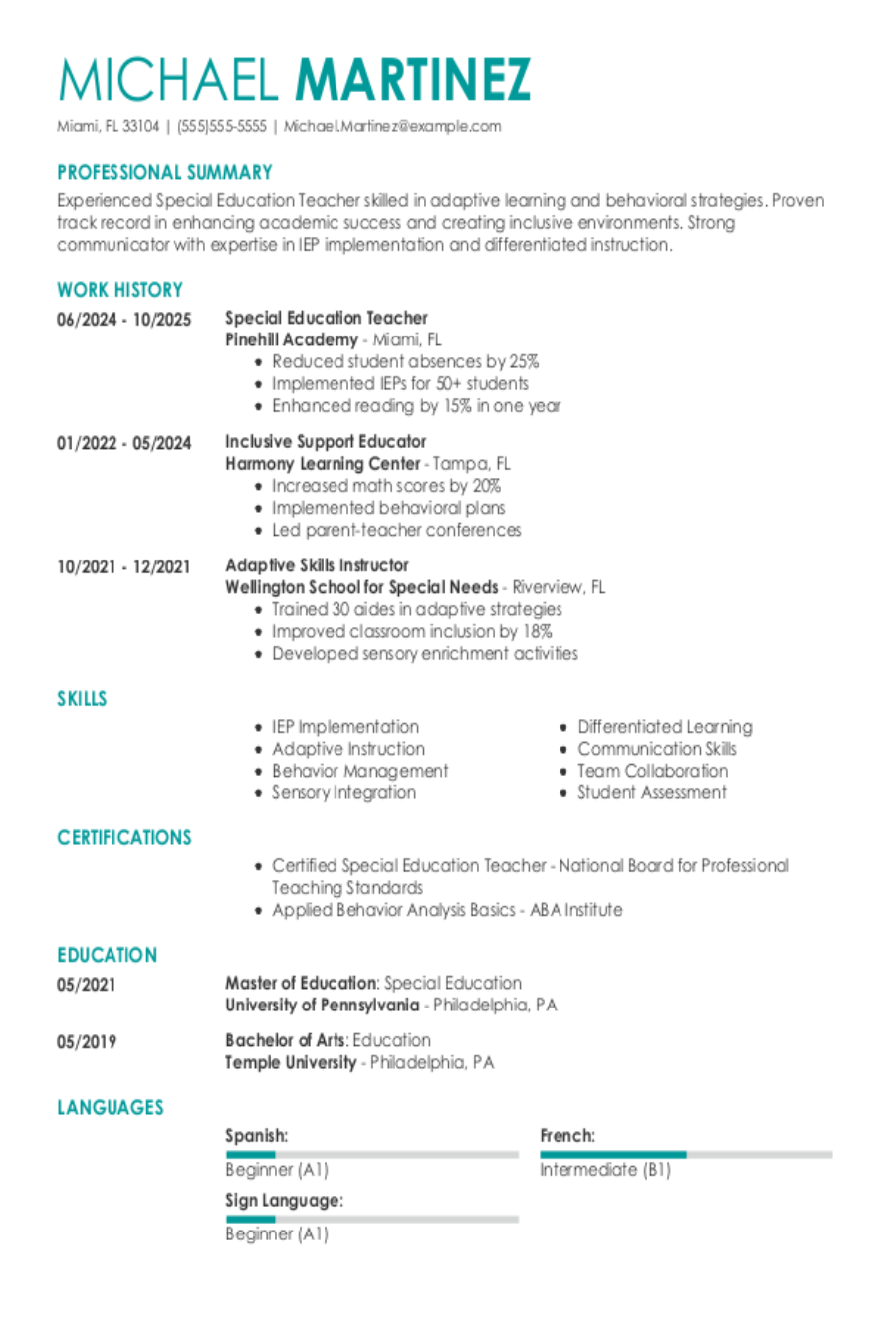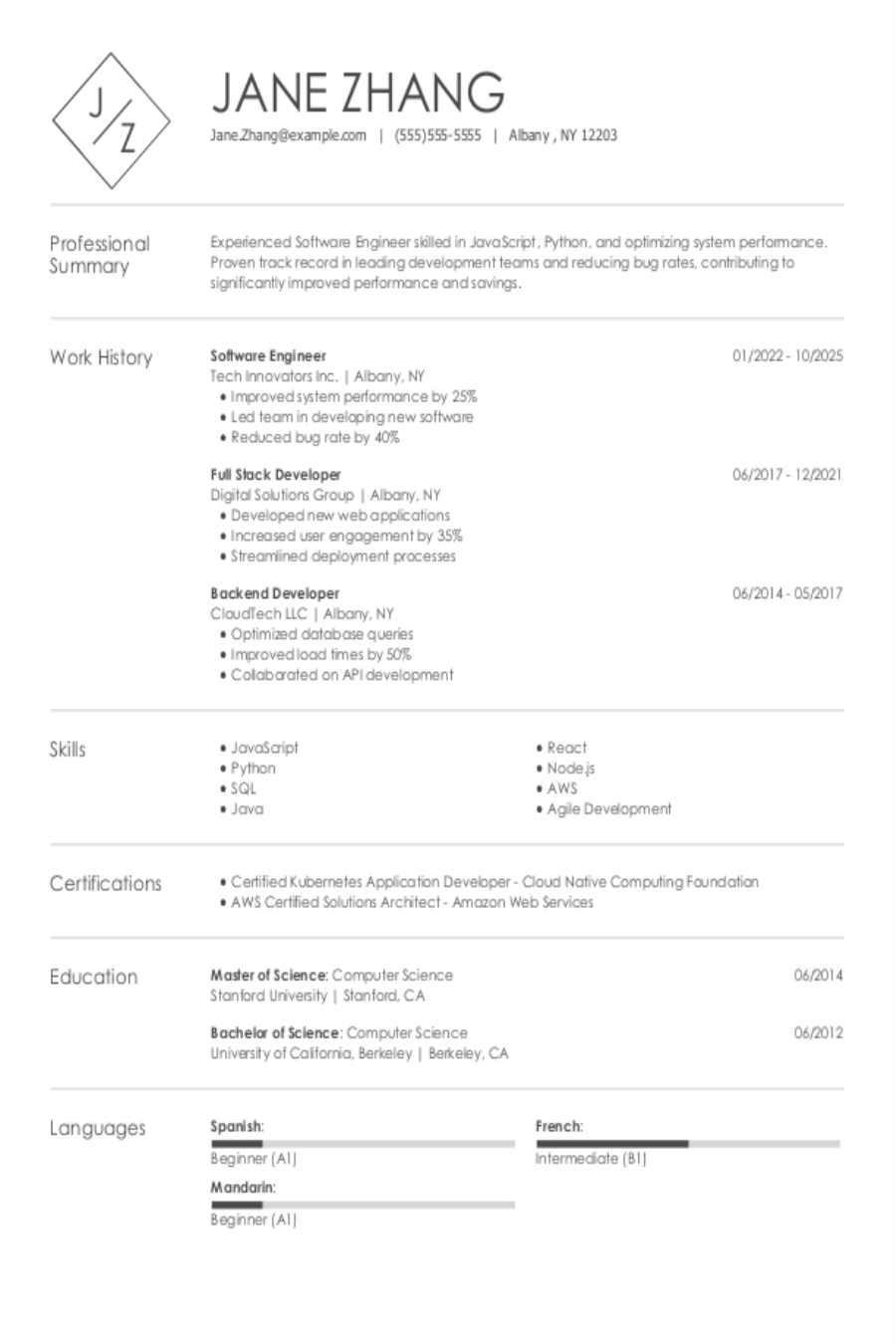Navigating the job market means getting comfortable with uncertainty. Even after getting an interview, you'll still need to wait to hear back from the employer, follow up, and potentially sit through more interview stages before finally receiving an offer.
But what can you do when your follow-up isn't acknowledged? Our guide will answer this question and more.
We'll cover:
- How to follow up after an interview
- Potential reasons why the employer isn't responding to your follow-up emails
- What you can do if you don't receive a response after a follow-up
Need a resume to get your job search to the interview stage? Try Resume Now's AI Resume Builder for AI-powered writing assistance, stylish ATS-friendly templates, and step-by-step guidance through each resume section.
How to Follow Up After an Interview
After an interview, you want to stay fresh in the employer's mind. Do this by sending a prompt follow-up email that acknowledges the interviewer's time, thanks them for considering you, restates some of your key qualifications, and reminds them that you're excited about the role and what you can bring to it.
Here's a template for an effective follow-up email:
Subject: Thank You for the Interview – [Job Title]
Dear [Interviewer's Name],
I greatly appreciate the opportunity to speak with you about the [Job Title] position at [Company Name]. Our conversation provided valuable insight into the role's responsibilities and the impactful work being carried out by your team.
I was especially interested in our discussion about [specific project, initiative, or focus area], as it reinforced my interest in applying my expertise in [area of expertise] to further [Company Name]'s mission. I believe my background in [relevant skill/experience] positions me well to contribute effectively to the challenges and opportunities we discussed.
Please let me know if I can provide any additional information to support your decision-making process. Thank you again for your time and consideration. I look forward to the possibility of contributing to [Company Name]'s continued success.
Sincerely,
[Your full name]
[Your phone number]
[Your email address]
You should send your follow-up email roughly 24 to 48 hours after the initial interview. This will keep your conversation fresh in the interviewer's mind. If you miss this window, it's acceptable to send a follow-up a bit later, but exercise common sense. If you haven't heard from the employer in, say, a month, a follow-up email is unlikely to yield results.
Why an Employer Is Ghosting You After an Interview
What happens if the interview went well, you sent a follow-up email in an appropriate time frame, and the employer never responds? Unfortunately, "ghosting" is a common complaint among job seekers about the interview process.
But why do employers ghost candidates, and does a lack of response always mean that you've been ghosted? Here are some common reasons why an employer may fail to respond:
#1
Human resources policy
Some companies have human resource policies that, for legal reasons, don't allow company employees to respond to any inquiries from interview candidates. While this isn't common, it can account for those rare situations where an employer appears to be ghosting a candidate, only to resurface with an offer weeks later.
#2
Lack of consideration
Unfortunately, inconsiderate behavior is always a possibility. Recruiters and hiring managers may be interviewing many candidates and may have simply decided that keeping appropriate contact with each one isn't a priority.
While this is an accepted practice, it isn't a good one and can indicate a culture issue with the workplace in question. Whether you've been rejected or not, the right thing to do is follow up on the status of the interview process.
#3
Stalling for time
While the interview process is ongoing for multiple candidates, the employer may keep you in the dark because they haven't made a decision yet.
Ideally, an employer in this situation would respond to you with an update on their process. However, employers may need to have an offer in hand when they reach back out, so they may wait until that offer is ready.
#4
Inefficient hiring systems
Interviewing, hiring, and onboarding are standard procedures at larger organizations, but small companies with little turnover might not be prepared for the complexities of the process. Keep this in mind when you apply to organizations that don't have a large staff.
#5
Ongoing interviews
With potentially dozens of candidates to go through, interviews can take multiple weeks to conclude. The employer may not be finished interviewing other candidates. Again, in this situation, an ideal employer would follow up and explain, but many don't.
#6
Scheduling conflicts
While your first interview was probably with a recruiter or talent acquisition specialist, subsequent interviews might require the participation of higher-ranking managers or entire panels of potential future colleagues. Coordinating these schedules can take time and may delay the employer's response.
#7
Overzealous communication
Perhaps you received a polite reply to your first follow-up email. And then you took it as an open door to keep sending messages. It's appropriate to follow up again after a week or so, but if you don't get a response to your second follow-up email, it's time to move on. Avoid continuously following up, hoping to get a response that won't come.
#8
Spam filters
Since employers may not have your email address in their address book or recognize who is writing, it can be sent to spam. Make sure to put something in the subject line to identify the position you're writing about. A focused and specific subject line, such as "Enjoyed Our Chat – [Job Title] Interview," should help address this issue.
#9
Internal disorganization
Think about the jobs you've had in the past. Has there ever been a week or two where everything went haywire; important emails went out late, client questions went around in circles, and customers took notice?
Every organization has its share of bad days and weeks. Don't assume anything if you don't hear back right away. Stay calm, pursue other options, and check your inbox regularly.
#10
Lack of interest
Unfortunately, it's always a possibility that they've decided not to pursue your candidacy and have neglected to let you know.
This is frustrating, both due to the lack of closure and the inability to request feedback that can help you in your job search. A basic rejection email is a professional courtesy, and it reflects poorly on an organization if they don't send one.
It may not seem like it now, but being ghosted by an organization like this is sometimes the best-case scenario. If this is how they treat the talent they're trying to attract, imagine how they must treat employees!
What Can You Do if You Follow Up and Get No Response
Being left hanging can be a frustrating experience. You might start to feel like updating your resume and leaping back into the job search. But is this really the right thing to do? Yes!
Think of the job search as a continuous ebb and flow until you land that new job. While you're interviewing for one role, you might slow down your pace for applying to other roles, but you shouldn't give up on job searching until you land the position you've been looking for.
While it's good to keep an open mind, being ghosted by an employer is a pretty strong signal that you should continue applying elsewhere.
Take a close look at your resume, finish that professional certification you've been thinking of pursuing, experiment with that interesting new resume template you've had your eye on, and get back out there. You can always accept the role if the employer gets back in touch.
As you prepare to pursue other opportunities, here are a few things you can do to follow up with the role after the interview:
Send another follow-up email
If your first follow-up email doesn't receive a response, that's a strong indicator that the employer isn't interested; however, a second follow-up won't hurt. Make sure your subject line is strong, relevant, and appropriate. Your second follow-up should be brief and to the point. Something like:
Subject: Following Up – [Job Title]
Dear [Interviewer's Name],
I wanted to briefly follow up regarding my application for the [Job Title] position at [Company Name]. I remain very interested in the role and would be glad to provide any additional information you might need.
Thank you for your time and consideration.
Best regards,
[Your Full Name]
Reach out on LinkedIn
If you haven't heard back after sending a follow-up email, you can also try reaching out politely via LinkedIn if you have the interviewer's LinkedIn details. For this scenario, send a short private message reminding them of your interest in the role and gently requesting feedback. Do not continue to send messages to their account after this.
Here's an example of an appropriate follow-up:
Hi [Interviewer's Name],
Thank you again for the opportunity to interview for the [Job Title] role at [Company Name]. I truly enjoyed our conversation and remain very interested in the position. If possible, I would greatly value any feedback you could share from the interview, as I'm always looking to improve while pursuing opportunities.
Final Thoughts
As a job-seeker, it can sometimes feel like the employer holds all the cards. This can make communication—or lack thereof—with recruiters and hiring managers feel frustrating and confusing.
The most important thing to remember is to keep moving forward with an open mind. Don't assume that you've landed the role because of a single good interview, and don't assume you've been rejected if your email goes unanswered for a few days.
Do all you can and then move on. This means following up politely and continuing to apply to other roles in the meantime. Every interview is a learning experience that brings you closer to the role you've been hoping for.
Key Takeaways
Follow up with an email after the interview.
Send a brief email within 24 to 48 hours after the interview to thank the employer for their time and remind them that you're the right candidate for the role by discussing the organization's goals and your specific skills.
Don't panic over a lack of response.
A lack of response can be a rejection, but it can also be the result of an ongoing interview process, a breakdown in communication, or a simple delay. Don't make assumptions in either direction and be prepared to move forward with your job search.
Follow up again.
There's no rule against following up again if an employer seems to have ghosted you. Try sending an additional follow-up email after about a week. You can also shoot the interviewer a quick message via LinkedIn to make every possible effort at getting a response before you move on.
Was this information about No One Responds After Job Interview Follow Up helpful? Let us know!
Hailey is a career advice writer dedicated to helping job seekers excel in their careers.
More resources

37 Unique Skills to Put on Your Resume
Trying to avoid the skills you see pop up on resumes repeatedl...

Resume Now Spotlights 14 High-Innovation, High-Growth Jobs That Pay $60K+
Resume Now s latest report highlights some of the highest payi...

Bad Cover Letter Examples: How To Fix Those Annoying Mistakes
Check out four sample cover letters and then learn from a pro...

Sports Coach Resume: Examples, Templates & Tips for 2025
Whether you re a seasoned professional or just starting your...

Special Education Teacher Resume: Examples, Templates & Tips for 2025
Want to write a special ed teacher resume that lands you a rol...

Software Engineer Resume: Examples, Templates and Tips for 2025
Want to get interviews in 2024? Our software engineer resume g...
